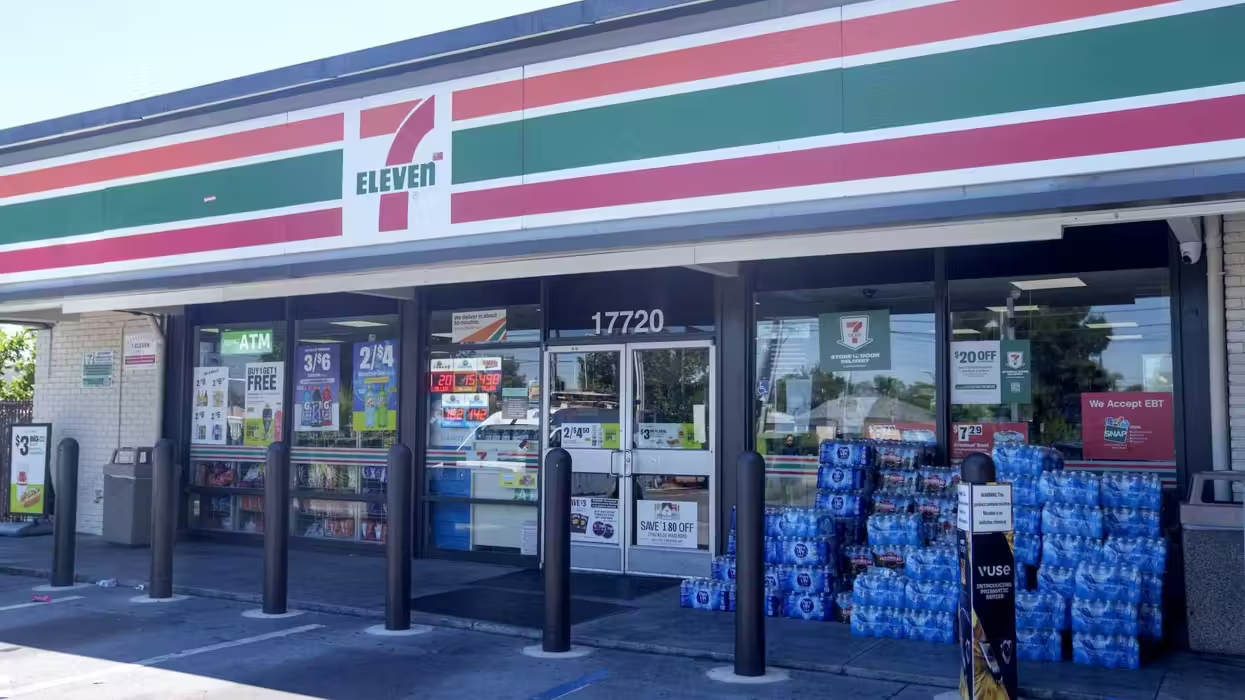
© 2025 Blaze Media LLC. All rights reserved.
Civil Asset Forfeiture Victim Fought — and Won — When the Government Tried to Take His Property
October 02, 2014
"It's just sickening, here are the people who are supposed to be protecting us, and they're stealing from us."
Imagine owning your home outright after finally paying off the bank. You're nearing retirement, and you're making plans to travel and visit the grandkids. Then one day, you get a letter from the government with an unexpected declaration: We now own your house.
Russ Caswell, a 72-year-old business owner from Massachusetts, got one of those letters. Except the government seized his entire business -- a motel worth nearly $2 million -- without so much as a warning.
 Russ Caswell stands in front of the Motel Caswell in 2011. The business owner said the government tried to take his property purely for profit, and that they targeted him because he had his building completely paid off. (Image via Facebook)
Russ Caswell stands in front of the Motel Caswell in 2011. The business owner said the government tried to take his property purely for profit, and that they targeted him because he had his building completely paid off. (Image via Facebook)
"When this first started, I got this notice in the mail and I thought it was some sort of mistake or something, with no warning, no nothing ... basically, after you got through all the legal mumbo jumbo, it said, 'We're taking your property,' and I was dumbfounded," Caswell told TheBlaze.
The Drug Enforcement Administration seized the budget motel under civil property forfeiture regulations because the agency claimed illegal activity was taking place at the establishment. The Motel Caswell then became the centerpiece of a bizarre federal court case: The United States of America v. 434 Main Street, Tewksbury, Massachusetts.
Caswell said he was hoping during the trial he'd at least find out why this was happening; he still had no idea why the government was coming after his livelihood. He hadn't been charged with a crime.
"My lawyer deposed eight of the local police and I figured I’d find out what they say I should have done or didn't do, but it turns out after the depositions none of them said a single thing against me, it's like they were on my side -- I don't think they were or weren't -- but they had nothing to say against me," he said.
But when Caswell's lawyer asked Vincent Kelley, a Drug Enforcement Administration agent, to explain how he picked certain properties to seize, that's when the motel owner said he knew "what the case was really about."
The DEA agent revealed that their process included seeking out places that were linked to drug arrests, but they would only try to seize properties that had at least $50,000 in equity.
"So then it was like a light went off," Caswell said. "Now I get what this is about, it's not about drugs at all — it's about stealing people's property."
When the case went to trial, Caswell said, the police testified that the motel owner and his wife had fully cooperated with officers each time a call was made to their precinct or when an arrest was made. Caswell said the judge asked some pointed questions of the law enforcement agents: "She asked, 'What do you expect Mr. Caswell to do that he isn't already doing?"
"I’ve never been charged with any crime in my whole life. As I learned firsthand, though ... the government has the power to seize property if it’s linked to a crime — even if the owners are completely innocent," Caswell wrote in an op-ed earlier this year. "Even worse, I had to prove my innocence in court. For civil forfeiture, innocent owners like me are actually treated worse than criminals."
The Institute for Justice, a nonprofit public-interest law firm, learned of Caswell's case and decided to help; by the time they took the case pro bono, the Caswells had already spent nearly $100,000 in legal bills trying to keep their motel.
"Seeking to circumvent state law and cash in on the profits, the Tewksbury Police Department teamed up with the United States Department of Justice to take and sell the Caswells' property because a tiny fraction of people staying there during the past 14 years were arrested for drug crimes," the Institute for Justice states on its site. "Keep in mind, the Caswells themselves have worked closely with law enforcement officials to prevent and report crime on their property. And during those 14 years, the government pointed to a mere 15 arrests—out of more than 200,000 rooms rented during that time by the Caswells."
In January, a federal judge ruled against the government and stopped the forfeiture. But taxpayers still lost out: the government then had to pay back the nearly $1,000,000 in legal fees racked up during the trial.
"I don't think they know what to do when people fight back," Caswell said. "It's an affordability thing, you just can't afford to fight the federal government and so people give in to them because in some cases it costs you more to fight it then you would actually get out of it, and that's how [the government] wins these things."
 For the Record highlighted the staggering equitable sharing payments the federal government and states have racked up over the last several years. (TheBlazeTV)
For the Record highlighted the staggering equitable sharing payments the federal government and states have racked up over the last several years. (TheBlazeTV)
TheBlaze TV's For the Record revealed other stories similar to Caswell's in its Wednesday episode, "Seized." Some of those people lost tens of thousands dollars in the process.
"If they were doing they job, there wouldn't be drugs on my property, but now they want to reward themselves at my expense for their failure? It's bizarre, this isn't something you'd expect in America, you'd expect it in Russia, or Venezuela or even in Germany years ago," Caswell said. "It's just baffles me that this law is still even in existence, it just allows the cops and the federal government to steal people's property -- if they would have been able to seize my property the Tewksbury Police would have taken in about $1 Million ... that goes straight into their department."
While Sen. Rand Paul (R-Ky.) and a handful of other legislators are fighting to change the laws, the risks still run high for Americans who could be targeted by a federal-local law enforcement system where both sides reap the monetary rewards when a civilian’s property is seized.
Caswell told TheBlaze he recently sold his motel because, even before the nightmare of a legal process came to his doorstep, he was ready to retire and take care of his ailing wife.
"The place just sold for $2 million ... that's what they were after, they were after the money," Caswell told TheBlaze. "To me, it's just sickening, here are the people who are supposed to be protecting us, and they're stealing from us."
Watch For the Record on demand on TheBlazeTV.
--
Follow Elizabeth Kreft (@elizabethakreft) on Twitter
Want to leave a tip?
We answer to you. Help keep our content free of advertisers and big tech censorship by leaving a tip today.
Want to join the conversation?
Already a subscriber?
more stories
Sign up for the Blaze newsletter
By signing up, you agree to our Privacy Policy and Terms of Use, and agree to receive content that may sometimes include advertisements. You may opt out at any time.
Related Content
© 2025 Blaze Media LLC. All rights reserved.
Get the stories that matter most delivered directly to your inbox.
By signing up, you agree to our Privacy Policy and Terms of Use, and agree to receive content that may sometimes include advertisements. You may opt out at any time.






